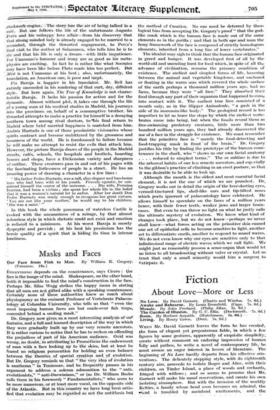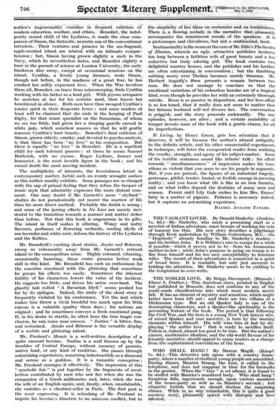Fiction
About Love—More or Less
Living. By Henry Green. (Dent. 7s. 6d.)
WHEN Mr. David Garnett leaves the form he has created, the form of elegant yet preposterous fable, in which a few figures by some gestures, apparently of exquisite simplicity, create without comment an enduring impression of human folly and pathos, to write a novel of contemporary life, he Must arouse an eager interest- -in lovers of literature. The beginning of No Love hardly departs from his effective con- ventions. The delicately stepping style, with its eighteenth century airs, proceeds to isolate Roger and Alice, with their children, on Tinder Island, a place of woods and orchards, fringed with willows ; and so seems to promise that 1Kr. Garnett will- make his -usual reservations, and create his dwn isolating atmosphere. But with the invasion of the worldly Kelties, a family whose head soon becomes an. admiral, the ItAand is troubled by mainland excitements, and the author's- impersonality vanishesfrequent eriticisin of
modern education,- warfare, and ethics.- Benedict, the indul- gently reared child of the Lydiates, is made the close com- panion of Simon, the fantastic, neurotic son of the conventional intruders,' Their ventures and piracies in the sea-fragrant, apple-scented island, are related with an, intimate compre- hension ; but, Simon having grown slightly a snob in the Navy, which he nevertheless hates, and Benedict slightly a boor in the pursuit of science at London University, the early frankness dies away, except at occasional reunions on the island. Cynthia, a lovely young dreamer, weds Simon though not before, in the madness of a great fear, he has crushed her softly expectant love. When the War involves them all, Benedict, on leave from minesweeping, finds Cynthia working with his father as a land girl. With joyous arrogance he snatches at her for his ecstatic need, then leaves her bewildered in silence. Both men have thus ravaged Cynthia's tender spirit in their desperate hours ; and some readers at least will be charmed that she ends in the keeping of Paul Rigby, for that ironic specialist on the Sumerians, of whom we see too little, had given her a sleeping gazelle carved in white jade, which somehow assures us that he will gently reassure Cynthia's hurt beauty. Benedict's final criticism of Simon, grown elderly, cranky, and devoted to psycho-analysis, is that there has been "no_ love" in his composition. But there is equally " no love " in Benedict. He is a repellent child for such tolerant parents : at times he seems Samuel Butlerish, with no excuse. Roger Lydiate, farmer and humanist, is the most lovable figure in the book ; and his casual death the most moving incident.
The multiplicity of interests, the feverishness latent in contemporary matter, forbid such an evenly wrought surface as this author usually exhibits. Some passages are so charged with the sap of primal feeling that they refuse the lacquer of ironic style that admirably expresses the more distant com- ment. One may doubt if Mr. Garnett's more " stylized " studies do not paradoxically cut nearer the marrow of life than his more direct method. Probably the doubt is wrong ; and some of the jarring effects in No Lore are merely inci- dental to the transition towards a manner and matter richer than before. Not that this book is ungenerous in its gifts. The island in itself makes it alluring. Winey and nutty flavours, perfumes of flowering orchards, cooling idylls of sea-lavender and white mist, inform the history of the Lydiates and the Kelties.
Mr. Bromfield's exciting short stories, Awake and Rehearse, sweep us vehemently away from Mr. Garnett's reticent island to the cosmopolitan scene. Highly coloured, vibrating, occasionally haunting, these conies promise better work still in this kind. Mr. Bromfield has such an enthusiasm for the macabre combined with the glistering that sometimes he grasps his effects too easily. Sometimes the inherent futility of his characters lowers the value of the incident. He suggests too little, and drives his satire over-hard. The ghastly tale called " A Bavarian Idyll " seems pushed too far by its epilogue. Indeed, the unity of the short story is frequently violated by his exuberance. Yet the zest which makes him throw a vivid brushful too much upon his little canvas is a valuable quality these days ; his notions are original ; and he sometimes conveys a fresh emotional pang. If, in his desire to startle, he often loses the true tragic con- clusion, he can come near success.. " Justice " is bitter, fine, and restrained. Awake and Rehearse is the versatile display of a mobile and glittering talent.
Mr. Presland's Mosaic is a well-written description of a quite unusual heroine. Nadine is a waif thrown up by the troubles of Central Europe, without memory of parents, native land, or any kind of tradition. She passes through astonishing experiences, remaining indestructible as a diamond and serene as a goddess. It is a romantic conception ; Mr. Presland manages it effectively. The impression of this " symbolic Isis " is put together by the fragments of recol- lection contributed by men who saw her when she was the companion of a Greek-millionaire; and, later, -whe:n she was the wife of an English squire, and, finally, when, unsubduable, she vanishes as a chestnut-seller in Paris. The first part is the most engrossing. It is refreshing of Mr. Prealand to impute his heroine's disasters to no amorous conflict, but to *he simplicity of her ideas on economics and on truthfulness. There ika flowing rnelody, in the narrative that- pleasantly accompanies the reminiscent moods of the speakers. It is a picturesque and :chivalrous,-but not a sentimental, bciok.
Sentimentality is the worm at the core of Mr. Ellis's The Garden of Illusion, wherein an ugly, attractive publisher hesitates too long between a faithless wife of great beauty and a less seductive but truly adoring girl. The book contains two delightful country houses, and the publisher and his brother are often entertaining in conversation ; but the throbbing sobbing worry over Thelma becomes merely tiresome. Mr. Herbert Asquith's Roon presents a woman between two men. He does not manage to convince us that the emotional variations of his colourless heroine are of a tragical kind, even though he provides her with an extremely thorough suicide. Roon is so passive in disposition, and her love affair is so low toned, that it really does not seem to matter that her fatuous husband will not divorce her. The conversation is priggish, and the story proceeds awkwardly. The war episodes, however, are alive ; and a certain amiability of temper invests some of the book. with a gentle charm, for all its imperfections.
.If Living, by Henry Green, gets less attention that it deserves, it will be because the author's absurd antipathy to the definite article, and his other unsuccessful experiments in technique, will deter the exasperated reader from realizing the cruelty, strength, and agony of his subject-matter. Some of his terrible sentences sound like infants' talk ; his effort towards " simultaneousness " of impression makes his tran- sitions so violent that you seem to see his people in segments. Efut, if you are patient, the figures of an industrial tragedy, grotesque, pitiful, tender, brutal, or foolish, emerge in accusing reality ; and you know what life is like in an iron foundry, and on what trifles depend the destinies of many men and women. Persist until Lily Gale rushes to kiss Mrs. Eames' baby in a scatter of pigeons. Patience is necessary indeed, but it captures an astonishing experience.
RACLLEL AN:NAND TAYLOR.























































 Previous page
Previous page